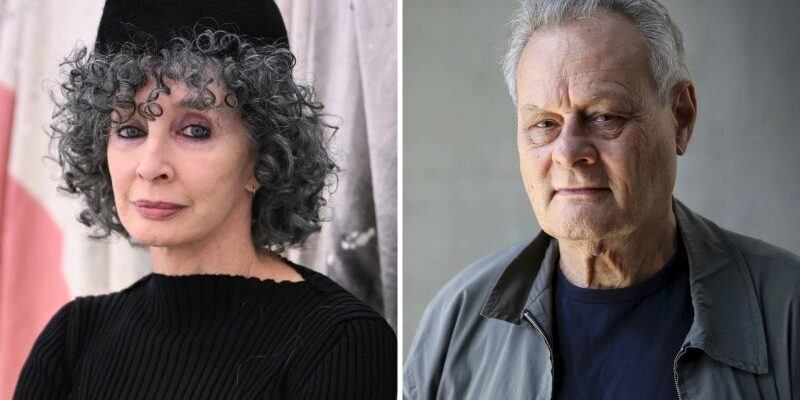Save articles for later
Add articles to your saved list and come back to them any time.
Contemporary artist Mike Parr says his most recent work of performance art “has been completely obliterated” in the wake of gallery owner Anna Schwartz’s decision to end their professional relationship.
As part of his work Sunset Claws, which remains on display at the Anna Schwartz Gallery until December 16, Parr wrote a series of words while “in a state of somnambulism”.
Mike Parr’s work Sunset Claws is currently on display at Anna Schwartz Gallery.Credit: Zan Wimberley via X
Schwartz has represented Parr for 36 years, but dropped him after he painted the words “Nazi” and “Israel” during the performance. Parr acknowledges both words may appear in the work but in an interview on ABC’s Radio National on Tuesday morning stated, “I never brought together the words Israel and Nazi”.
Parr says the artwork drew on statements from the London Review of Books, related to the latest conflict in the Middle East.
“The problem that my performance tried to address is the complexity of this whole situation,” Parr told this masthead on Tuesday. “It was a kind of continuation of openness, discussion and democratic debate about the problem.
“Anna’s response is overwhelmed by her subjectivity. And perhaps her subjectivity in the face of what is happening now in this conflict between Israel and Palestine also obliterates not just my performance, but the debate that we’re all entitled to have about the disproportionate impact of what’s now happening in Gaza.”
Speaking to ABC’s Radio National, Parr said he felt his performance had been censored and that “no one else has been asked what they thought” of his performance.
“I wasn’t trying to provoke Anna. What I was trying to do was provoke debate around the whole issue of this crisis,” he said.
Parr received an email the morning after his December 2 performance, saying his relationship with the gallery had been terminated.
Parr called Anna’s response “rather hysterical” and said it had drawn attention away from the complexity of his performance. He said supporters of Palestine need to be heard in the current conflict.
Anna Schwartz dropped artist Mike Parr from her gallery following a political performance work.Credit: Joe Armao
In his radio interview, Parr said that ahead of the performance Schwartz asked him, “Mike, why aren’t you protesting about the plight of the Hutus and the Uyghurs?” to which he says he responded: “Because Anna, right at this moment you are a national treasure, but you’re displaying absolutely no empathy for the plight of the Palestinians,” and criticised her attempt at “moral relativism”.
“The real issue here is that without a resolution to this problem of co-existence, the position of Israel becomes increasingly more fragile,” he said.
“I support the right of the Israeli state to exist. My real issue is, if this problem of co-existence isn’t resolved, then increasingly the Jewish state is threatened by unmanageable responses.”
Speaking on ABC’s Radio National on Monday morning, Schwartz denied censoring Parr’s work, leaving it on display at the gallery, but said she felt Parr’s performance piece on December 2 was his intentional ending of their relationship.
“I can’t work with an artist who has chosen to hurt me and insult my culture and the generations who come before me who have been annihilated,” she said.
Schwartz’s husband Morry, who owns Schwartz Media and is the publisher of the Quarterly Essay, The Saturday Paper, The Monthly magazine and Black Inc books, yesterday stepped down as the company’s chair, saying it was the right moment to take a break and that that coverage of Gaza was not a factor.
Parr said he has no plans to return to the gallery Schwartz owns in Flinders Lane, and now wants to “cool off, calm down and go on with my work.”
“I’ve been a performance artist for over 50 years, and it’s always been controversy,” he said.
“I’m nearly 79 years of age, and I’m at the point where cancellation doesn’t mean very much, but cancellation is very destructive for younger artists. It’s very hard for them to take positions they want to take because they run the risk of terminating their careers in some instances.”
Anna Schwartz was approached for comment but had not responded by deadline.
The Morning Edition newsletter is our guide to the day’s most important and interesting stories, analysis and insights. Sign up here.
Most Viewed in Culture
From our partners
Source: Read Full Article


